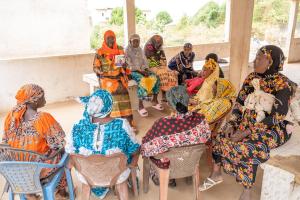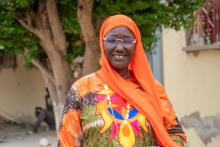Community approach contributing to maternal health in Senegal
Dakar – Ndèye, 29, mother of three children and living in Guédiawaye in the outskirts of Dakar, says she has always had difficult pregnancies. “I gave birth at home for my first two pregnancies, and for my last child, the beginning was difficult. I was dizzy all the time and felt very tired, and yet I told myself that it would pass, that it was normal,” she explains.
Like Ndèye, many pregnant women in Senegal delay the decision to seek medical attention, which can lead to sometimes tragic complications for both mother and child. In 2023, the maternal mortality rate was 153 per 100,000 live births and the infant mortality rate was 40 per 1,000 live births in the country.
To address this situation, Senegal is stepping up initiatives including social mobilization. One such initiative is "Badiénou Gox" programme, drawn from traditional family leadership role of the role of badiène –the sister of the head of the family – to contribute efforts to reduce maternal and infant mortality. Since being launched in 2009, around a thoudand women have been trained under the programmeon using their position as respected leaders to support community health outreach initiatives.
“The Badiénou Gox are valuable health educators both in maternity wards and in communities. They are neither midwives nor nurses, but their privileged relationship with women in their community is a great asset,” explains Dr Amadou Doucouré, head of the maternal and child health department. “They are women’s confidants, making them powerful agents of social change.”
Thanks to concerted national efforts and the contribution by the Badiénou Gox, Senegal has seen a reduction in maternal mortality and under 5 children between 2009 and 2017 from 319 maternal deaths per 100 000 live births to 236 per 100 000 live births. Neonatal mortality fell from 26 deaths per 1000 live births to 21 per 1000.
The Badiénou Gox carry out public awareness about the risks associated with pregnancies unattended by a trained practioner, home births and the importance of vaccination for newborns and children under 5 years old. Other activities include promoting of family planning, support to victims of gender-based violence, membership in health insurance and birth registration. The Badiénou Gox also play a crucial role in finding and encouraging patients on treatment to maintain their regimen.
“I deeply love what I do. Every day, I feel honoured to be able to help and support the families around me,” says Oulèye, 52, Badiénou Gox in Guédiawaye. “The respect and recognition I receive from my community, the authorities and their partners are a huge source of motivation.”
World Health Organization (WHO) is one of the partners supporting the government in implementing the Badiénou Gox programme. WHO is also supporting the Ministry of Health and Social Action, thanks to donor funding, to strengthen the Bajenu Gox programme and promote maternal and child health. This process includes the revision of the tools, the strategic framework and the decree to refocus activities on Maternal, Neonatal, Child and Adolescent Health (MRNCAH).
"We are proud to support the Senegalese authorities, through the Badiénou Gox initiative, to strengthen maternal and child health programs in the country," says Dr Jean Marie Vianny Yameogo, WHO Representative in Senegal. “WHO will continue to provide support for the continued success of these community initiatives which have a significant impact on public health. Ultimately, better trained and motivated Badiénou Gox will help reduce delays in care, thereby improving maternal and child health in Senegal.”
Advances in maternal and child health in Senegal strengthen the commitment of the Badiénou Gox despite the significant challenges they face, including reluctance among some communities HPV vaccination
“Thanks to several strategies, we are able to overcome the obstacles to population health. “We educate and inspire change, which allows us to overcome cultural barriers and false beliefs,” explains Badiène Oulèye. She adds that these efforts also helped convince Ndèye to have her 9-year-old daughter vaccinated against HPV, thereby strengthening her family's protection.
Ndèye, who benefited from advice of Badiène Oulèye, is grateful. “She encouraged me to go to prenatal consultations. It was during a visit that it was discovered that I was suffering from severe anemia. “I was treated and my health improved,” says Ndèye. “I gave birth without complications. I breastfed my baby exclusively, on the advice of Badiène Oulèye and my child is doing well.”
Chargée de communication en appui aux pays francophones
Bureau régional Afrique de l’OMS
Email : asekpon [at] who.int (asekpon[at]who[dot]int)
Chargée de Communication
OMS Sénégal
Email : sallai [at] who.int (sallai[at]who[dot]int)

